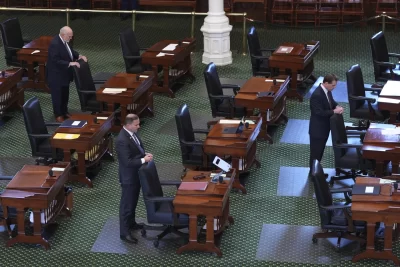
McALLEN, Texas — President Donald Trump’s administration has started requiring parents looking to reunite with their children who crossed into the U.S. alone to show up for interviews where immigration officers may question them, according to a policy memo obtained by The Associated Press.
Legal advocacy groups say the shift has led to the arrest of some parents, while their children remain in U.S. custody. The U.S. Department of Homeland Security did not confirm that or answer questions about the July 9 directive, instead referring in a statement to the Biden administration’s struggles to properly vet and monitor homes where children were placed.
The Office of Refugee Resettlement, which is part of the U.S. Health and Human Services Department and which takes custody of children who cross the border without a parent or legal guardian, issued the directive. The agency said the goal is to ensure that sponsors — usually a parent or guardian — are properly vetted.
The memo is among several steps the Trump administration has taken involving children who came to the U.S. alone. Over the Labor Day weekend it attempted to remove Guatemalan children who were living in shelters or with foster care families.
The July 9 memo regarding sponsors, first reported by CNN, said they must now appear in person for identification verification. Previously, sponsors could submit identity documents online. The directive also says “federal law enforcement agencies may be present to meet their own mission objectives, which may include interviewing sponsors.”
Neha Desai, managing director of human rights at the National Center for Youth Law, said the change provides U.S. Immigration and Customs Enforcement a “built-in opportunity” to arrest parents — something she said has already happened.
Mary Miller Flowers, director of policy and legislative affairs for the Young Center for Immigrant Children’s Rights, said she knew of a case in which immigration officers arrested the father of a child under the age of 12 who had shown up for an identification check. “As a result, mom is terrified of coming forward. And so, this child is stuck,” Miller Flowers said.
Desai also said the interviews are unlikely to produce information authorities don’t already have. Vetting already included home studies and background checks done by Office of Refugee Resettlement staff, not immigration enforcement.
The Office of Refugee Resettlement said it communicates “clearly and proactively” with parents, telling them they may be interviewed by ICE or other law enforcement officials. It said parents can decline to be interviewed by ICE and that refusal won’t influence decisions about whether their children will be released to them.
“The goal is to ensure that every child is released to a stable and safe environment and fully vetted sponsors by ensuring the potential sponsor is the same individual submitting supporting documentation, including valid ID,” it said in a statement.
However, Desai is aware of a situation in which a sponsor was not notified and only able to decline after pushing back.







